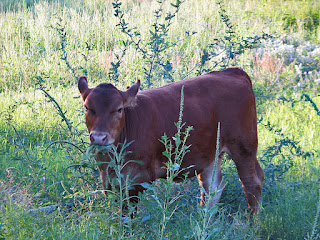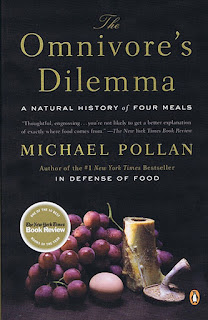Warning #2: today’s post may be very long.
As of Saturday, we have approximately 150 pounds of beef in our freezer. While this may seem excessive to you, imagine how shocking it is to me, a former vegetarian. |
| Alton Brown's beef map, source |
How did we find ourselves in such strange circumstances? It was a long road. In the past few years, the Piemaker has gone from the all-American, 3-squares-a-day, meat-based type of diet to a single meal each day consisting of a huge salad. He usually eats a meat dish once a week at the most.
I’ve gone in the other direction. I have come a long way from my Diet for a Small Planet days, circa 1975, when I gave up meat forever (forever turned out to be 3 years) for political and humanitarian reasons. Today I eat meat regularly, but I do still believe that the mass production of animals for food is one of the most cruel and unhealthy activities that humanity engages in, and that the resulting meat reflects the terrible conditions that the animals endure. I also still believe that the growing population of the world cannot be fed adequately by animal protein and that at some point, if we are to survive, humans will have subsist on plant or manufactured proteins.
That said, if one shifts from a global view to a local view, there is still the possibility for communities in some areas of the world to provide a healthy, varied diet to their populations, if they follow socially responsible food production and consumption principles. Sharing is the most obvious one of these, and is the reason for the success of community gardens throughout the ages. My best example is a simple one: here in the low desert we can grow huge amounts of citrus and some herbs in the winter, while our friends in Northern Arizona have no citrus at all, but they are overrun with tomatoes every summer. Sharing the wealth with each other and many other friends and neighbors creates ripples of benefits through a large community. Soon everyone is exchanging bundles of fruits and vegetables (and once in a while, a plate of cookies!) over fences.
 |
| Double Check Ranch steer having a snack, source |
My philosophy basically condenses down to one central concept: I want to know what is in my food and where it came from before I eat it.
As you may know, taking a personal interest in in your own health or that of food animals can make it difficult to eat! We all went through the days when organic vegetables were nearly impossible to find and exorbitantly expensive if available. Now it is the animal products. Cage-free eggs are getting easier to find, but they are three times the cost of regular. Grass-fed beef is available at some grocery stores, but it’s twice the price of the alternative. I think you can only get the pork equivalent direct from the rancher, unless you find a seller at a farmers market.
When I learned that our incredibly talented farming friends were raising steers, I knew it was the best way to for us to go. I visited the animals and saw them running around in the meadow, enjoying their varied grassland. I knew that they were never exposed to illness or cruelty. The small local processor was able to kill the animals humanely (although this always sounds like an oxymoron). And, because of friends and friends-of-friends, we could all share the cost and get a large amount of food for significantly less than we would pay at the grocery store.
And so, the neatly-wrapped packages stacked in the freezer represent one quarter of a healthy animal that ate good food, got lots of exercise, and had a pleasant, if short, life. Have I made peace with eating him? I am working on it!What experiences have you had in this brave new world of food sourcing, food scares, and so much food information?
Katrina
An afterthought: I probably should have put this above, but I didn't want to goof up the fomatting.
Here is link to a website which lists grass-fed ranches and similar operations in the US and Canada. It's exciting to see that the number of listings has almost tripled in the last couple of years.
 |
| Lawton Family Sugar House grass-fed cattle in Massachusetts, source |
 |
| Fruitland America grass-fed cattle in Missouri, source |


As always, so very well expressed. Also something close to my heart.
ReplyDeleteI agree entirely with what you say. We try to eat only responsibly farmed or wild meat.
Interesting to hear about food supply with you. Over here organic and RSPCA monitored meat is freely available in even the small supermarkets. The organic is quite expensive but the humanely reared not so much more than the cheap meat. It seems worth it - I'd much rather eat less meat and eat better quality meat. With eggs here, the vast majority are either barn or free range and many supermarkets don't sell caged eggs. Standard price is £1.30 per half dozen for free range.
I grew up eating home reared poultry and pork so have never been squeamish about meat but consider myself more of an animal lover than someone who eats meat but refuses to acknowledge its source.
You make some very important points here - if only more people would act on them.
By the way, thought it was only me that struggled with blogger formatting! Struggling to upload photos today - grrr
Wow, or rather sorry - didn't realise I'd gone on so much!
ReplyDeleteI'm so glad you did, because I was hoping to hear about people's experiences in other regions. Without writing a 500-page dissertation on the government and corporate interests that control our agriculture, it's difficult to explain why US food production is this way. Fortunately our tiny individual efforts have their tiny individual impacts that grow over time. :)
DeleteThanks for your comments!
I love this post! It is a subject close to my heart as well. It makes me so happy that organic, free range and cruelty free foods are more readily available than they have been since the demise in America of the neighborhood corner market. I only purchase and serve food that meets those criteria, and most of it is locally sourced as well. There are several restaurants that I frequent that operate on the same philosophy, with more and more following suit every day. I know that eating this way is often more expensive and time consuming than the alternatives, but if those of us who are passionate about it remain committed, supply will respond to demand, prices will eventually drop, and accessibility will improve.
ReplyDeleteThanks for sharing your thoughts on such an important topic!
xo, Anita
Oh yes - we've got a few of those restaurants too! It's very exciting!
DeleteI absolutely agree with your comment about commitment. As a younger, more idealistic person, I was very impatient and often frustrated at the almost invisible rate of change in our society. Now I feel fortunate to have gained enough maturity finally to be able to see that commitment does make an impact over long periods of time.
I particularly worry about the high corn content in our (U.S.) food chain (from confectioner's sugar, baking powder, and xanthan gum to animal feed). A has a corn sensitivity; one of her friends is a "walking corn detector" and has such bad reactions she has to carry an epi-pen. Apparently it even shows up in things like the ground-beef tray desiccant pads and the glue on the ends of toilet paper rolls!
ReplyDeleteIt makes me wonder if it's a factor in increases in genetic disorders in recent generations.
Here's an article about cows being fed corn instead of grass (warning: not for the squeamish):
http://www.pbs.org/wgbh/pages/frontline/shows/meat/interviews/pollan.html
AGREE! I worry about the corn not only from the consumers' perspective (although I know it can make people very sick) but also from the cows' perspective. They are not built to eat large amounts of corn, it is terrible for their digestion, and it does not provide adquate nutrients. This weakens their systems so they have to be given numerous drugs, hormones, and supplements to counteract the problems brought on by malnutrition. All that could be avoided if they were given the food they evolved to eat, which is GRASS.
DeleteMuch of which is covered by your linked article, now that I've read it! :)
Delete